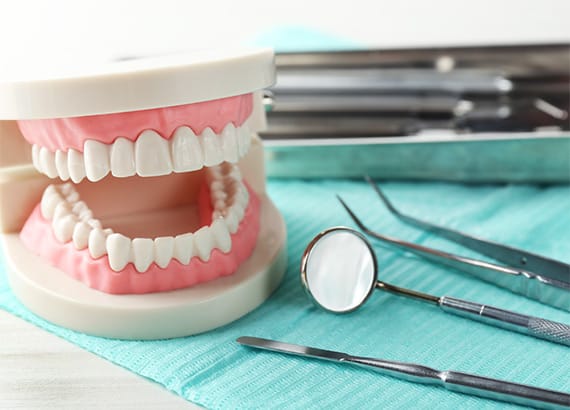Periodontal Disease Prevention and Treatment
Dr. Azar, DR. Haroon, and Dr. Kepic are board-certified periodontists committed to helping patients prevent periodontal disease from occurring or reoccurring and treating the disease when it is diagnosed. Periodontal treatment is necessary when various conditions affect the health of your gums and the regions of your jawbone that hold your teeth in place. Retaining your teeth is directly dependent on proper periodontal care and maintenance. Healthy gums enhance the appearance of your teeth, like a frame around a beautiful painting. When your gums become unhealthy, they can either recede or become swollen and red. In later stages, the supporting bone is destroyed, and your teeth will shift, loosen, or fall out. These changes not only affect your ability to chew and speak; they also spoil your smile.
Periodontal disease is the primary cause of tooth loss in adults. The gum, bone, and other supporting structures of the teeth are affected. The result will be tooth loss if untreated. Over 50% of adults 18 and over have at least the beginning stages of periodontal disease. About 75% of adults will be affected by periodontal disease sometime in their life. Even children can have early signs of periodontal disease. The early stage of periodontal disease is called gingivitis. The disease is still reversible at this point because only the soft gum tissue is affected. If this condition is not treated, it will advance to periodontitis. Periodontitis is a periodontal disease affecting the gums, bones, and other supporting structures. The dentist may describe to the patient that they have “gum pockets.” In most cases, periodontal disease can be prevented. Neglect or improper care of the mouth are the usual causes, but research has recently shown that genetics may be a significant factor.
New patients welcome. There is no need for a dentist's referral.
For new patients, click here.

Warning signs of Periodontal Disease
- Bleeding gums during tooth brushing.
- Red, swollen or tender gums.
- Gums that have pulled away from the teeth.
- Bad breath.
- Pus between the teeth and gums when the gums are pressed.
- Permanent teeth that are loose or separating.
- A change in the way your teeth fit together when you bite.
- A change in the fit of partial dentures.
You should check yourself for the warning signs of gum disease.
IMPORTANT: You may have gum disease that has spread into the bone and not have any symptoms. Gum disease often goes unnoticed because most people do not experience any pain.
Our Doctors Conduct a Very Thorough Examination to Diagnose Periodontal Disease
Periodontal probing is the cornerstone of testing for gum disease. A small measuring instrument calibrated in millimeters is gently inserted between the tooth and gum to measure the depth of the spaces (pockets) around each tooth. The deeper the probe goes, the more severe the periodontal disease.
In addition to probing, the gum tissue is checked for bleeding, tenderness, recession, and abnormal contours. The mobility of the teeth is determined. The manner in which your teeth come together upon closing (your bite or occlusion) is also assessed. Your full mouth x-rays are carefully evaluated for bone loss between the teeth.

Other Contributing Factors
Diet and smoking affect your oral health. A poor diet can lessen your body’s ability to ward off infections. Some researchers have shown that the disease progresses faster and is more severe in patients whose diet does not supply the necessary nutrients. People who smoke are more likely to have periodontal disease and also are a high risk for developing oral cancer. Stress is also a factor.
Various health conditions influence the progress of periodontal disease. Diseases that interfere with the body’s protective immune system worsen the gum condition. People with diabetes are likely to have periodontal problems because their body is prone to infection.
Thirty to 60% of pregnant women have inflamed gums. This is because hormonal changes during pregnancy increase the blood supply to the gums. Pre-existing gum disease, even in the early stages, can make these symptoms more severe. Recent studies have also shown a strong correlation between mothers with periodontal disease and low birth weight babies.
Many medications prescribed by your medical doctor may also affect your periodontal condition. These include but are not limited to oral contraceptives, antidepressants, steroids, and certain heart medications.
Various habits such as clenching or grinding the teeth may make the gum and bone support more susceptible to periodontal disease.
